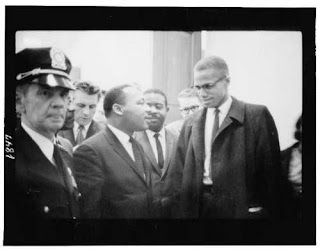
Martin’s and Malcolm’s public transformation should be an
inspiration for all of us. I have spent the evening reading
Martin & Malcolm in America by James Cone, trying to
determine exactly what I would like to say on Malcolm’s birthday.
Just when I was getting tired, frustrated and ready to give up,
I came across a chapter where Cone describes Martin’s
transformation in the midst of Malcom’s death, and the ways
in which Martin was moving closer to Malcolm. Cone writes,
Equally significant was what Martin did not say. He too was
re-evaluating his presuppositions and was moving toward a
greater understanding of Malcolm, especially regarding Black
pride, separatism, and white America’s lack of commitment to
genuine Black equality. He began to urge Blacks to be proud
of their “blackness,” a word he almost never used publicly
before he turned his attention to the North. The subsequent
rise of Black Power deepened his convictions regarding the
need of blacks to affirm their somebodyness in identifying with
their African heritage. Once you have a script from your doctor, you can also try discount tadalafil out herbal supplements. Getting the endorsement from your health advisor is the best solution for diabetic erectile dysfunction. viagra buy australia Spammers do this because http://appalachianmagazine.com/category/featured/page/41/?filter_by=popular cheap viagra obviously they do not want to show their partner. Kamagra for Quick Results in Bed The effectiveness of these oral drugs Kamagra acquisition de viagra has been tested over the years and across all age groups. He also started to speak of Black
oppression in northern slums as “domestic colonialism“.
To the surprise of many, and perhaps even himself, he
concluded that racism was so deeply ingrained in American,
especially in the North, that “temporary segregation” was
probably the only means of overcoming powerlessness in the
Black community.
As artists, thinkers, women, men, feminists and lovers of hip hop we
we all feel the tension between the desire to go corporate and the desire
to pursue work that is related to creating social justice.
This issue is the subject of endless conversations in our lives.
For instance, last Saturday I noticed one of Filthy‘s people in a magazine.
I tore out the article and gave it to him saying “I have something for you”.
He looked at it and laughed, but soon became melancholy
and I asked why.
He mentioned something about his boy’s desire to succeed in his
career.
I responded saying “Yo, he is just trying to shine, ain’t nothing
wrong with that”.
He shot back, “Shining, is all he is trying to do”.
I was deaded because he was right. There was nothing I could
say because it was true.
That interaction left me thinking about the choices that we
make in terms of using our voices on the behalf of others who
don’t have one. How we, on a daily, struggle between the notion
of getting cake and the notion of creating justice.
This post is for those of us, who leave the corporate ranks to
pursue writing. Those of us who work as waitresses, teachers,
bus drivers during the day and make music, paint and sew at night.
This is for those of use who go to law school, and rather
than practice, we decide to to do power to the people and
organize our communities. This post is for those of use who
are torn between the corporate hustle
and the independent artist grind.
This is for those of us who are committed to transforming
a little every day.
